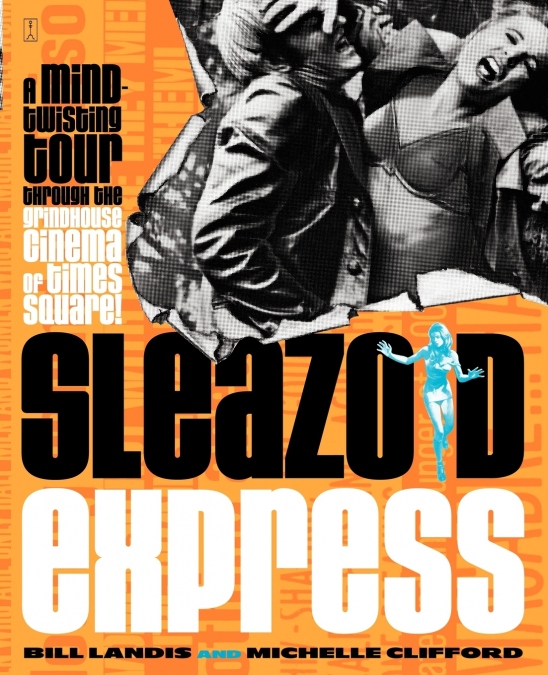
Bill Landis / Michelle Clifford
Times Square was once America’s most notorious red light and theater district. Its main artery was the Deuce, a tiny strip of neon and concrete coldly fleshing out 42nd Street between 7th and 8th Avenues. The street was wall-to-wall movie theaters, punctuated by high frequency shoebox-sized adult bookstores, male street hustling, weapons shops, phony drug salesmen, bootleg electronics stores, tourist junk shops, and guys offering couples to take their quickie Polaroid portraits while they sat in wicker chairs.The Deuce was the most intense block on which one could ever hope to see a movie. The main venues were grindhouses, down-at-the heels creations left over from the Minsky’s Burlesque days-and showcases for the wildest and most extreme films in cinematic history. Their disenfranchised audience were film’s harshest critics, demanding that the exploitation movies the theaters screened lived up to the promises made by their graphic, outrageous ad campaigns and shocking trailers. If the movies let them down, the audience would react by shouting, tossing food containers, and physically damaging the theaters. For exploitation movie lovers, going to a Deuce grindhouse was like taking your life in your hands for a cinematic thrill - which, of course, added to the fun and increased the shock status of the experience.Those theaters are gone, but the films remain. They’ve spread to millions across the globe through video and DVD. Wildly successful video companies like Something Weird and Grindhouse Releasing sell millions of vintage horror and sexploitation films that once haunted the Deuce. No more hard seats and sticky floors. Exploitation movie lovers now enjoy their entertainment in the safety of their bedrooms, watching a favorite film five times or more, gleefully programming their own double and triple features.Sleazoid Express: A Mind-Twisting Tour through the Grindhouse Cinema of Times Square will be an odyssey through the gritty venues of the old 42nd Street and into the world of the vintage exploitation movies in which they specialized. The book will span the halcyon era of the early-1960s through the mid-1980s, when American grindhouses began closing and the various exploitation movie genres moved to home video and DVD. It will reproduce for the reader what no home video can provide - the experience of watching an exploitation movie within the Deuce grindhouse setting, followed by behind-the-scenes talk about the movie’s production. Each chapter of Sleazoid Express will focus on a uniquely 42nd Street exploitation genre and supply a close, intimate portrait of its makers, stars and showcases. Sleazoid Express will be an exploitation film fan’s nirvana, while covering the essential works of the sleaze canon for a mainstream audience. The visuals will be a rich tapestry of graphic stills and rare original ad mattes. The chapters will contain sidebar interviews with and current photos of key exploitation film performers, producers, distributors and directors, many of whom the authors have known for many years. Exploitation movie makers, players, and merchants range from the eccentric to the outwardly criminal, and these will be rare interviews available in no other book. Detailed reviews of landmark films will also be presented as sidebars. Sleazoid Express will include an appendix listing various exploitation movie video companies and the genres they specialize in, with examples of the films that they make available.Sleazoid Express will combine a love for popular culture with an in-depth analysis of films that bring to light human nature’s subconscious impulses towards sex and violence. The reader will visit the old 42nd Street, see what’s playing and meet who was responsible for creating and merchandising the films. Sleazoid Express will be the definitive document of cinema’s most shocking and extreme moments and people as they exploded in a legendary place.